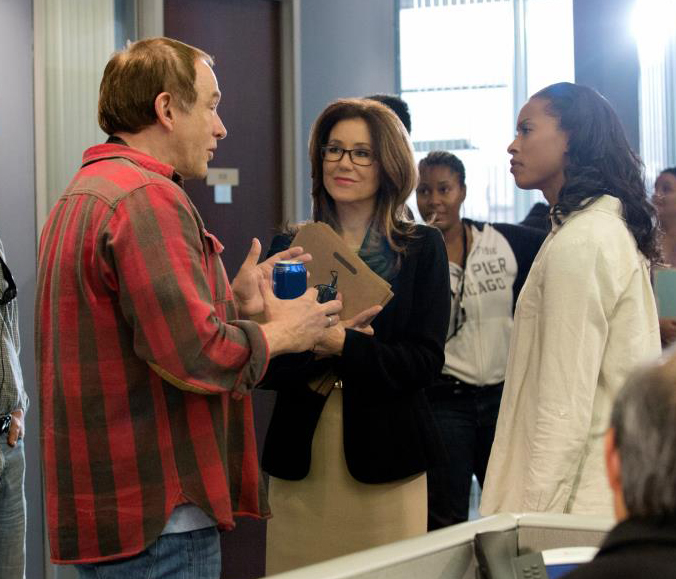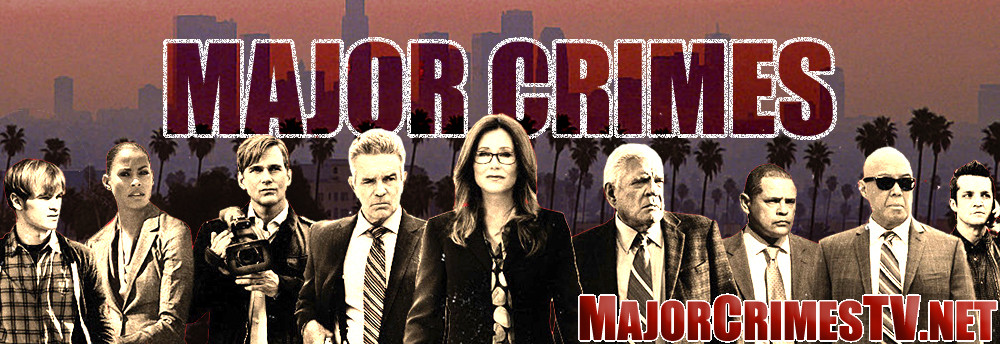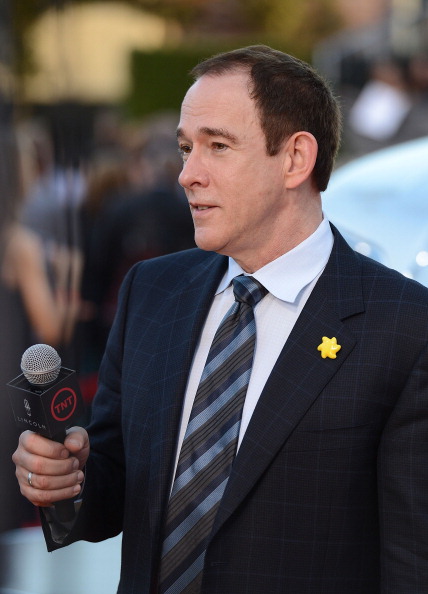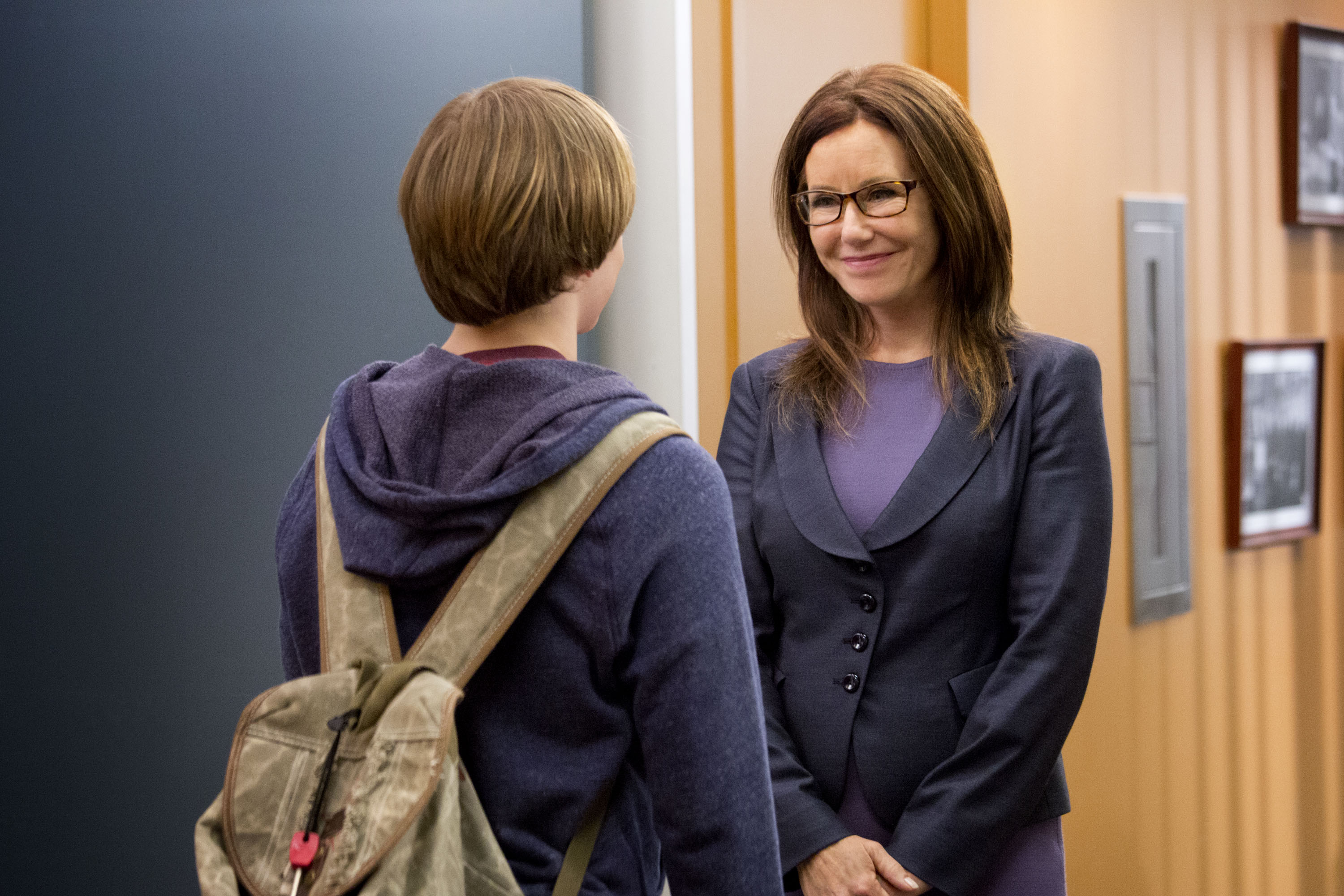By M. Sharpe
As the eve of the Season 2 premiere of Major Crimes approaches, Series Creator and Executive Producer James Duff can’t help but reminisce about the difference between when The Closer first premiered on TNT in 2005, and last year, when Major Crimes debuted directly after its series finale. “It’s a very different environment than when The Closer first started. Because there were only two shows on the air that season, and TNT was just beginning its thrust to original content. And now a new season has arrived and they have several one hour dramas on the air- almost a full network schedule.” Of promoting the series premiere of Major Crimes last year, he says it was problematic because, as the spin-off to The Closer, it relied on launching directly after that show’s final episode- and to say almost anything about the new show would give away the details of how The Closer would end. “It was a marketing nightmare, but we managed.”
They did more than just manage. Major Crimes set a new record as basic cable’s most-watched series launch ever and averaged 7 million viewers in its freshman season. Returning tonight for its second season, Duff is excited about the new storytelling opportunities that are being presented in Major Crimes, and while comparisons to The Closer are inevitable, he says that Major Crimes has truly developed into its own unique franchise.
“Because Brenda was just about getting the confession and that was the end of things. And we can’t afford to do that anymore. There is a limit to how much justice we can afford right now. And we can’t just arrest people and end things there. We have an obligation to try and make the justice system work without trials if we can avoid them. And it’s the suspect who has the right to trials, by the way, not the state. So the state isn’t really giving up anything by trying to maneuver people into accepting what’s in their best interest usually.
The other big difference is that the heart of The Closer was the emotional relationship between the husband and wife. Fritz and Brenda and their marriage formed sort of the emotional center of The Closer, and now that center is occupied by Sharon Raydor and Rusty Beck (Mary McDonnell and Graham Patrick Martin). It’s a mother and child relationship at the center of a homicide investigation, which I don’t think we’ve ever seen on television. And that’s largely because the mother figure as a homicide detective is very hard to keep up. She doesn’t exist in the real world as much as you might like to think.”
Duff says that while there are always exceptions, in general women on the police force very seldom stay in homicide after their children are born. “The truth is that being a mother and rolling out at 3am to a crime scene, those two jobs are somewhat incompatible. And Sharon Raydor herself was not a homicide detective while she was a mother, while she had her own children. It’s not until much later in life when she’s very experienced in parenting that Rusty has come along. So the emotional center in both shows has really changed.”
While Duff says that initially he did receive some negative feedback about introducing the Rusty character into the show, that reaction has now shifted quite starkly to where the character and his relationship with Sharon Raydor and the rest of the squad have become a beloved core of the show. “I think it’s because he’s not your ordinary teenager. And he’s not living an ordinary teenage life. That’s what makes it really interesting. And also, it’s a way of discussing what happens to witnesses in ongoing murder investigations. Because people don’t know that you have to keep tabs on all these people, and some of them require protection for years at a time. It’s an unexplored area of the law, and it gives us another way of looking at crime and at the justice system, which I’m always into. I’m really excited about looking at the justice system through this different lens.”
Rusty’s story is also pivotal to a shift in the way the show itself is structured. Where The Closer tended to have more closed-ended stories that tended to resolve by the end of every episode, Major Crimes has progressed into having sustained storylines that weave through many episodes, or even seasons. “Our stories are sort of bleeding over into one episode into the other, but that’s because the American appetite for that has allowed us to increase our character stories. We may have that too much, we may have not done enough, but I think the story of Rusty and his journey to the witness stand is a story that’s never been told, and just how tragically complicated this journey is for witnesses and criminal proceedings and how much the justice system depends on them to be there, and what they have to go through. We’re going to show all of that, and that creates a continuing story.”
Having overarching themes that connect each season is something that has been around since the beginning of The Closer, and that continues this year, says Duff. “We’re still thematically oriented. This season is about identity and about how our identities form, and if you watch the premiere, we begin with sort of a birth image. We talk about how identity is forged a lot of times by our different relationships and where we exist in terms of those different relationships.”

James Duff on the set of the pilot episode of Major Crimes with Mary McDonnell and Kearran Giovanni.
Photo Credit TNT
The Rusty storyline has also paved the way for more exploration into the characters and yes, identities of the rest of the Major Crimes squad. Of that, Duff says that it has given the writers an opportunity to explore the dynamics of the other characters through their interactions with Rusty. “They form a family unit for him, they create a home for him, and they have a special place in their hearts for him. This often happens in police work where you find a witness in a trial, or a person who has helped you, and you know they need you, and they’re going to have a long road ahead of them and they’re going to have to say some terrible things eventually about themselves in order to get to the truth, and you want to hold onto these people. There’s just various ways in which this is done, but this is Sharon’s way, and it’s the one thing, I think, that made her likeable to her team. They saw how far she was willing to go to help their witness, and it changed their attitude about her, and they all like the kid, and he’s having a big struggle.”
Another relationship that has gotten much attention since it was announced he would be appearing in a three-episode arc later in the season is that of Sharon Raydor and her estranged husband, played by Tom Berenger. According to Duff, the unconventional relationship between Sharon and Jackson Raydor is one he’s enjoyed exploring- and possibly revisiting down the road. “It’s a very interesting relationship. They’ve been married for over thirty years, and they’ve only lived together for ten, and they never divorced, and he’s still trying to kind of get back into her good graces, and you can see where they might have made a great couple. There are moments when they still do make a great couple, but ultimately, he is not probably capable of being the person she demands in a relationship, and his role as a father to his own children was fairly non-existent. He did not do very much as their father, and that’s a very hard thing to get over. But they have never divorced, which is odd. I mean, I find it odd.
Oscar Wilde said many years ago, and more wisely, that men often get remarried because they’re willing to try their luck again, and women often don’t get remarried because they are ready to cut their losses. And I think that there’s some truth in that, that the partnership aspect of marriage appeals to women, but once they get to a place where they are managing quite fine, thank you, on their own, they are warier, and I think with reason. So I think the relationship that Sharon has with her husband is interesting. I’d like to see him come back. I think it is a relationship worth pursuing and Tom Berenger was a wonderful addition to the cast. He was great to work with, and GW has known him for thirty years and Mary has done plays with him, and so he felt very familiar coming into the company and going onto the set. Everybody liked Tom enormously.”
Regarding the addition of Nadine Velazquez to the cast as Emma Rios, the new D.D.A. assigned to the Phillip Stroh case (and thus overseeing Rusty as a witness), Duff agrees that in a way, the character is an antagonist to Sharon Raydor- much the way Sharon herself was once the antagonist to Brenda Leigh Johnson on The Closer. “(Emma) is a bit of a non-edited personality. She’s always looking at the endgame. From the moment she steps onto a crime scene, she’s thinking of what it would be like to be in a courtroom with the murderer and how to avoid it. And the rest of them are just trying to solve the murder. And so that’s an annoyance. And also she has her own interests in terms of how the state should work, versus how Raydor wants to do things. Here you have two women in power arguing about the justice system and I like that a lot. They’re not arguing over a guy, they’re not arguing over clothes or shopping, they’re arguing over their different views of the justice system. And I think they’re going to continue arguing over their different views of the justice system because they represent different interests.
Emma’s point of view is very valid. She starts out attacking Rusty living with Sharon, and she’s not wrong. She’s 100% right that it creates an issue, and it really is something that I bet the audience hasn’t thought of, and that concern will continue. So she is, I guess, in broader terms, she is an antagonist for Sharon, and that’s what Sharon was to Brenda, so in a way, she does have her own antagonist now, but it’s a different kind of antagonism. It’s a different point of view on the justice system, which is what Brenda and Sharon also experienced. Brenda had a very different point of view on the justice system from Sharon, and Sharon has a very different point of view of the justice system from Emma.
That none of the viewpoints are necessarily wrong is going to become a problem for Sharon Raydor, and the decisions she must grapple with. “Raydor’s superpower is just automatically knowing what’s right,” says Duff. “She has an instinct for what’s right. But what happens when you have two right paths in front of you? How do you choose between two right answers? That’s a very deep question, I think.”
By M. Sharpe


